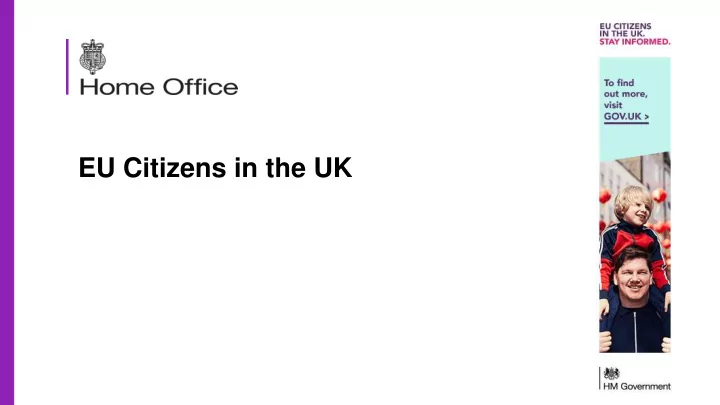

EU Citizens in the UK
Agreement reached with the EU ❖ In December the UK government reached an agreement with the European Union on citizens’ rights. In March this was extended to cover those arriving during the implementation period. ❖ The agreement protects the rights of EU citizens after the UK leaves the EU and enables them to continue to live their lives as now. It also covers their family members. ❖ Further information on the agreement at GOV.UK. 2
Applying to the EU Settlement Scheme Applying to the Settlement Scheme ❖ EU citizens and their family members in the UK will need to apply to secure their rights through a simple digital system to get their status ❖ The application process will be as quick and user-friendly as possible. The Home Office is working with representatives of EU citizens on its design and development ❖ A new dedicated and proactive contact centre and casework team will be in place to support citizens ❖ We will be looking for reasons to grant , not to refuse 3
Applying to the EU Settlement Scheme Applying to the Settlement Scheme ❖ To obtain settled status EU citizens and their family members will generally need simply to have lived continuously in the UK for five years . Those with less than five years ’ residence will be granted pre-settled status until they accumulate their five years ❖ An application will cost £65 and £32.50 for children under 16. It will be free for those with valid documented permanent residence or valid indefinite leave to remain or enter ❖ We will check the employment and benefits records the Government holds to establish the period of residence, meaning most applicants won’t need to do anything to prove their residence. Where there are gaps, a wide variety of documents can be photographed and uploaded as evidence 4
Applying to the EU Settlement Scheme Applying to the Settlement Scheme ❖ Most EU citizens will only need to prove their identity , demonstrate their residence in UK and declare any criminal convictions ❖ The application form will be accessible through phones, tablets and computers and we will provide support for those that need it. Identity can be verified remotely via an android app, or via a quick postal route ❖ We are conducting a managed, live trial with a small cohort of applicants working or studying in the North West of England, which began on 28 August 2018. The Scheme will be phased in later this year, before it opens more widely. It will be fully open by the end of March 2019. ❖ Irish citizens do not need to apply for to the Settlement Scheme to protect their status and rights 5
Vulnerable citizens ❖ Diverse group with wide range of needs, such as: - identifying need to apply - help with technology - support with language - demonstrating meet criteria ❖ End-to-end application assistance / help accessing services with status once granted, including: - Translations - Assisted Digital - Specialist teams, & all staff trained in safeguarding - Policy provisions - Indirect support from external parties, such as local authorities (e.g. looked-after children), community groups and charities 6
EU Settlement Scheme timeline EU Settlement Scheme Timeline 7
Communications and Engagement ❖ Targeted national campaign: Educate – prepare – deliver ❖ Multi-channel engagement is underway to reach the estimated 3.4m EU citizens living in the UK ❖ Direct email contact with 200,000+ subscribers to EU citizens’ updates ❖ Stakeholder engagement including through communities, employers and local authorities ❖ Toolkit for employers and community groups 8
Employer Toolkit The toolkit contains an introduction pack, practical plan and relevant materials to help employers and service providers around the EU Settlement Scheme. Please see an outline below of the key contents that will be provided. 9
What does the Settlement Scheme mean for employers? Employers have a duty not to discriminate against EU citizens in light of the UK’s decision ● to leave the EU as both a prospective and current employer. Current ‘right to work’ checks (e.g. EU passport and / or national ID card) apply until the ● end of 2020. There will be no change to the rights and status of EU citizens living in the UK until 2021. Employers are not expected to pay / support the cost of the EU Settlement Scheme ● application for their EU citizen employees. They are welcome to do so at their discretion. There is no legal obligation for them to communicate the EU Settlement Scheme, ● however they may wish to signpost the information the Government is providing. They do not have to interpret information provided by the Government and they must be ● careful not to provide immigration advice. 10
Next steps ❖ Continue development and testing of the Scheme, in consultation with end users ❖ Review pilot and amend Rules, guidance and processes as necessary ❖ Publish user guidance ❖ Expand communications and engagement campaign 10
12
Recommend
More recommend